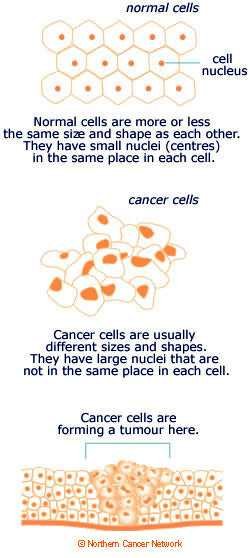Cancer is a disease that affects the body’s cells. You get cancer when normal body cells get out of control, do not stop dividing, and spread.
What are cells?
 The body has billions of cells. They are so small that you can see them only with a microscope. They are a bit like building blocks – groups of cells make up all the organs and tissues of the body. The lungs, liver, kidneys and skin, for instance, are all made from cells.
The body has billions of cells. They are so small that you can see them only with a microscope. They are a bit like building blocks – groups of cells make up all the organs and tissues of the body. The lungs, liver, kidneys and skin, for instance, are all made from cells.
Our bodies automatically make new cells when we need them. If you cut your hand with a knife, your body makes cells to heal the wound and grow new skin. Children make new cells so they can grow into adults. Every day, some of our cells get old and die just through normal wear and tear, so we make new ones to replace them.
Usually, cells grow in a controlled and orderly way. Each cell knows exactly what to do, when to do it and when to stop. It has a nucleus (centre) that contains all the instructions it needs.
How cancer cells are different
Cancer cells don’t behave like normal cells. They have gone wrong in some way, and follow different instructions. They can avoid the body’s attempts to control them.
One difference between normal cells and cancer cells is that cancer cells don’t stop dividing. They carry on dividing and usually form a lump called a malignant or cancerous tumour.
Sometimes non-cancer cells carry on growing too, so not all tumours are cancers. If a tumour is not cancer, it is called a benign tumour. Benign tumours can cause problems, but they are not normally as dangerous as cancer.
Cancer cells spread to nearby areas. This is called local spread. The cells take up more and more space and can push their way into healthy parts of the body and damage them.
Cancer cells can also spread to distant parts of the body. They normally do this by getting into the bloodstream or the lymphatic system. The lymphatic system makes and stores cells that fight infection. There are lymph channels and lymph nodes all over the body. Blood or lymph moves the cancer cells around the body until they get stuck somewhere. Then they start growing in this new place, forming secondary tumours or metastases.
Most cancers form tumours but not all do. Leukaemias, for instance, are blood cancers. In these diseases the cancer cells start to replace normal white cells. If you have too few white cells, you can’t fight infections and you can get very ill.
Cancers can cause problems as they grow and spread. They may press on nerves and cause pain. They may cause fluid to build up, for example in the lungs, making it harder to breathe. They may cause a blockage in the bowel, for instance. They may stop healthy parts of the body from working.
Normally, if you are infected by something such as a flu virus your body tries to fight it off. You may not need to go to the doctor. But because cancer cells are quite like normal cells, your body doesn’t fight them in the same way. Left untreated, most cancers are very dangerous.
